Spanish public opinion on immigration is growing increasingly polarized.
This analysis examines Spanish public opinion on immigration in recent years based on a number of surveys, the most recent from 2020. There has been a slight increase in negative attitudes towards immigration, although it is not clear to what extent this shift can be attributed to the institutional presence of VOX, or else to events like the COVID-19 pandemic and irregular immigration to the Canary Islands. However, the impact of the emergence of VOX as a political force is noticeable in terms of increasing ideological polarisation in Spain, a situation that hinders rational debate on immigration and how to manage it.
Analysis
Introduction
Despite being the EU Member State with the highest level of immigration per capita throughout the past 20 years, international and comparative opinion studies have shown that Spain has consistently maintained more open attitudes towards immigration than the European average, with less rejection and a greater appreciation of its contribution to society and the economy. There are historic reasons for this phenomenon, including the experience of Spanish migrants in the 1960s and the backlash against nationalism as a result of the Franco regime. Regardless of the cause, relatively permissive public opinion has contributed to the fact that until recently there have been no political parties in Spain that have campaigned on an anti-immigration platform to successfully gain an institutional foothold. This had made Spain an exception in the European context, where the presence of ‘nativist’ parties has become a common feature of parliaments and in many cases governments. However, the Spanish exception came to an end in 2018 with the success of VOX in the Andalusian elections and its entry to the Spanish Congress of Deputies the following year.
On immigration, like many other issues, experts have debated the extent to which political parties merely act as a conduit for the opinions of the electorate, and to what extent they actively shape public opinion, on account of their ability to set the agenda in the public sphere.1 The emergence of VOX as a force in Spain’s political institutions can be viewed –at least in part– as the result of a hardening among Spanish public opinion –or a significant part of it– towards immigration, despite the fact that the issue of Catalan independence has played a much greater role in VOX’s strong showing in the elections of the past two years. On the other hand, the increased visibility and respectability lent by the party’s presence in Spain’s democratic institutions suggests that its success may be fuelling the expression of anti-immigration sentiment in Spain, normalising and legitimising attitudes and opinions that were previously socially unacceptable. In other words, VOX could encourage more hard-line stances and the rejection of immigration.
This analysis seeks to determine whether the emergence of VOX has coincided with an increase in anti-immigration sentiment in Spain and whether there is evidence that the platform provided by public institutions is contributing to an increase in restrictive attitudes among the Spanish public. In other words, it seeks to gauge the extent to which VOX’s political platform is the result and/or cause of an increase in anti-immigration sentiment in Spain.
To answer this question, we first need reliable survey data based on adequate samples of the Spanish population at different points in recent years. The main source for Spain is the survey on attitudes towards immigration, which has been run by the Centre for Sociological Research (CIS) since 1990, with a sample size of around 2,500 respondents. The most recent survey, jointly carried out by CIS and the Spanish Observatory for Racism and Xenophobia (Oberaxe), which forms part of the Ministry of Inclusion, Social Security and Migration, dates from 2017. There is also data for previous and subsequent years from the European Social Survey (ESS), with a sample size of around 1,500 people per country and which includes a number of questions on migration. Our analysis is based on the data for the last three waves of the ESS in Spain, which correspond to 2015, 2017 and 2019.2 Finally, to analyse the most recent changes, we use data from the EASIE survey on attitudes towards immigration in Spain, carried out by the Institute for Advanced Social Studies of the Spanish National Research Council (IESA-CSIC) in October 2020, with a sample size of just under 2,400 respondents and which includes some of the same questions as CIS and ESS.3
When analysing the results of surveys on migration, it is important to consider potential distortions caused by social desirability pressures. This factor can affect any sensitive issue and is particularly notable when it comes to immigration. Experiments have shown that many respondents tend to misrepresent their opinions on issues regarded as sensitive, avoiding responses that might display unacceptable attitudes and behaviour (in this case racism and xenophobia). This bias affects the accuracy of results, particularly for in-person interviews, where the interviewer is physically present to interview the respondent. In contrast, social desirability pressures are generally lower on telephone interviews and even lower on online surveys. The CIS and ESS surveys are carried out in person and the EASIE survey was conducted mainly online.4
The potentially uneven impact of social desirability biases hinders the comparison of surveys from different years that have used different procedures to gather data. It may be the case that people whose opinions remain unchanged between one survey and another feel less social pressure in one context and express themselves more freely, voicing opinions they did not feel comfortable expressing the first-time round. In the case of hardening stances on immigration, this would be a probable effect of VOX: people’s opinions may not have changed much but, rather, been given a certain social respectability by the institutional presence of individuals who publicly share such views. The converse may also be true: members of the public who are against VOX may hold back increasingly on expressing anti-immigration sentiment to avoid being associated with the far right.
Changing attitudes towards immigration in Spain
Immigration has multiple effects on economic, social and political life. Among Spanish citizens, its perception varies depending on people’s position in the labour market, place of residence and ideology. Moreover, opinions also vary for different groups of immigrants.
For this reason, surveys on this topic include various indicators and questions: there is no single survey item whose results can be regarded as the ‘best’ way to understand public opinion on immigration. The analysis presented here is based on some of the most common questions from the above-mentioned surveys, whose formulation captures fairly general aspects of public opinion on the impact of immigration (is it good or bad for the country or for the economy?) or how it should be managed by the State (are the rules too lax or restrictive, or are they just right?). Our analysis here does not provide an exhaustive treatment of attitudes towards immigration and immigrants but instead examines certain indicators of their recent evolution.
The ESS data shows that between 2015 (when Spain began to emerge from the Great Recession) and the end of 2019 (ie, after the success of VOX in the recent Andalusian, European and national elections), Spanish public opinion on the effects of immigration on the country improved continuously, above all when asked about its economic impact. However, during the following year, through to the EASIE survey in October 2020, this trend appears to have reversed, moving towards slightly more negative positions, although it should be noted that on balance opinion remains more positive than negative (averaging more than five on a scale of 0-10).

This change could be a product of the severe economic crisis caused by the COVID-19 pandemic. The pandemic has had a particularly negative impact on immigrants, sparking debate in the media about the risks of transmission associated with their living and working conditions, especially for agricultural workers. Although negative attitudes to immigration often increase during times of economic crisis, this has been compounded by the fear of transmission. Similarly, the arrival of thousands of irregular migrants to the Canary Islands in small boats during the second half of 2020 and the political conflict surrounding the responsibility for their reception has also increased the visibility of this aspect of immigration in the media. Something similar happened in 2006, when a wave of mass arrivals to the Canary Islands catapulted immigration to the forefront of Spanish public opinion. Against the backdrop of these causes (the crisis, the pandemic and irregular arrivals), the anti-immigration discourse of VOX, broadcast from the country’s parliaments, may also be having an impact.
The results of these four surveys show an increasing distance between attitudes towards immigration in Spain as opinions move towards more extreme points of view. The increase in the standard deviation (which measures the heterogeneity of responses) supports this point. The standard deviation from the mean response to the question ‘Does the arrival of people from other countries make Spain a better or worse place to live?’ has risen from 2.18 in 2015 to 2.56 in 2020. Similarly, for the question ‘Is it good or bad for the Spanish economy that people from other countries come to live here?’ the figure has increased from 2.39 to 2.61. For both indicators, the majority of the change occurred between 2019 and 2020. The widening of the distance between opinions on immigration may be due to VOX, whose electoral success could cause a shift towards more favourable stances to immigration on the left as a counter reaction to the message of VOX, while the converse may be true on the right.
When responses are analysed in terms of the ideology of the respondents, the data shows that the relationship between ideology and opinions on immigration is growing stronger. In other words, the difference in attitudes of people on the left and right sides of the spectrum is increasing. Ideology has always been an important factor, both in Spain and throughout the rest of the world: the right is always closer to restrictive and nativist positions (‘our country first’), while the left tends to be more open to immigration and universal egalitarianism. However, the data show that the difference is growing and this could be related to the rise of VOX in the political system.
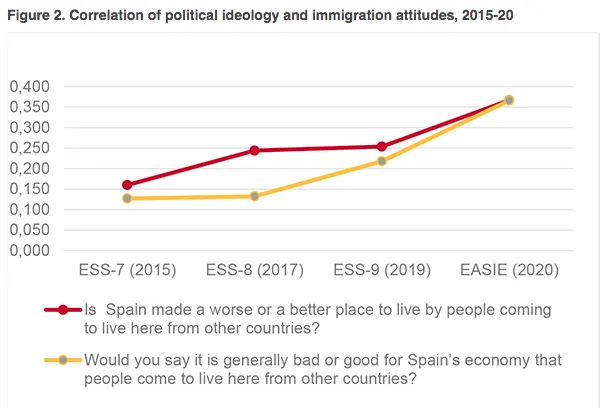
The percentage of strongly unfavourable responses to the question ‘Does the arrival of people from other countries make Spain a better or worse place to live?’ saw little change in the period under consideration (2015-20), but differences based on political ideology (previously small) have widened. A growing proportion of those who identify with the centre right or far right voice strongly unfavourable opinions, while the proportion of people critical of the impact of immigration fell among the centre left and far left.5
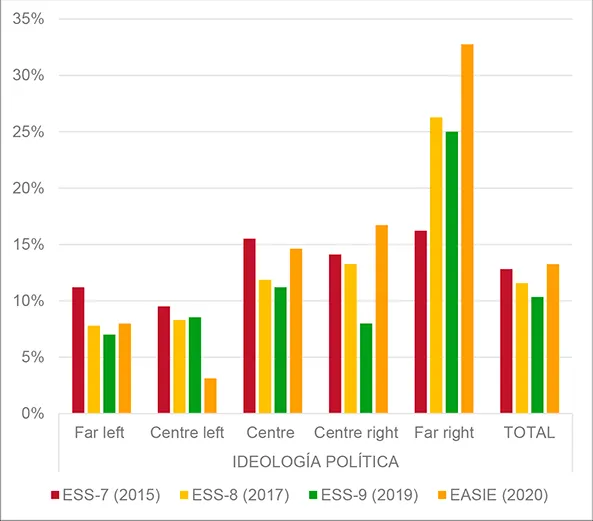
These data suggest that the effects of the rise of VOX as a political force in Spain on stances towards migration vary in line with people’s political ideology, meaning the party may be acting as an additional catalyst for polarisation. In contrast to the increase in strongly unfavourable attitudes towards immigration among people with right-wing views (above all the far right), the converse is occurring among people on the centre left.
Another question we have chosen in order to analyse these changes over time explores opinions towards immigration policy and is included in the CIS survey for 2017 and the EASIE survey for 2020. The wording of the question is: ‘In your opinion are the laws for foreign nationals who wish to enter and remain in Spain too tolerant, reasonably tolerant, just right, reasonably strict or too strict?’. The vast majority of the public lack detailed knowledge of Spanish immigration law, meaning the responses indirectly reflect the public’s level of satisfaction with their perceived results and the government’s ability or willingness to manage the issue in line with respondents’ preferences. The results show an increase in more restrictive positions, that is, the group of people who think extant laws are ‘too tolerant’. This increase appears to have come from people who were previously sceptical of immigration, that is those who believed laws were ‘rather tolerant’, with the same six percentage point fall in this group being gained by the group with the most restrictive stance, making it the largest (35% of responses). Taken together, the number of people who believe that laws are tolerant (too tolerant or rather tolerant) is much higher than the number of people who believe that they are rather harsh or too harsh (and would thus prefer greater openness to immigration) or those who believe that they are just right. In 2020 and in previous years –albeit with a different degree of emphasis– 60% of people had restrictive attitudes, compared to 16% who would prefer more open immigration policies and 20% who were satisfied with the status quo.
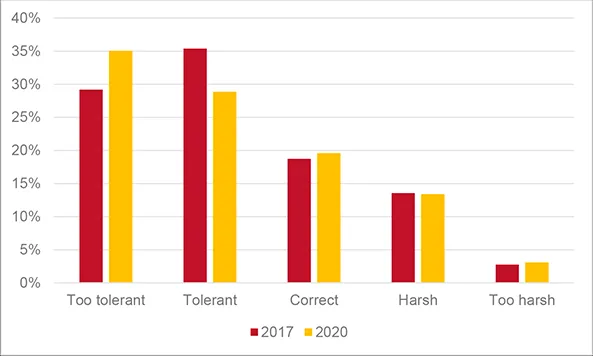
The idea of too much tolerance is slightly more widespread (a difference of over five percentage points compared to the mean) among people who are middle-aged, have basic education, are self-employed and live in the south of Spain. Moreover, it is most prevalent among those who identify with the political centre (46%), centre-right (48%) and far right (71% of which believed immigration laws were ‘too tolerant’). In contrast, acceptance of this idea falls sharply among young people (18-29 years of age), graduates, people who identify with the political left and people who live in the north of Spain, where the proportion of migrant population is lower than in the south.
Here too, we see the polarisation of public opinion, with a substantial increase in the distance between right and left and the two poles moving in opposite directions (towards more restrictive attitudes on the right and –albeit with lesser intensity– to more open positions on the left).
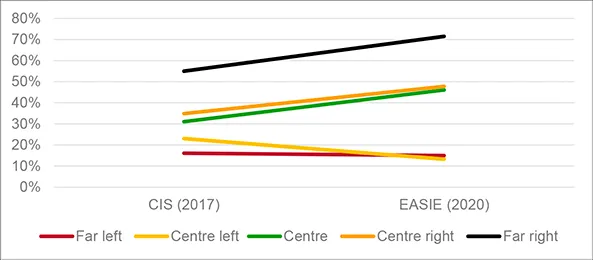
Finally, we have compared the results of a survey item regarding the perception of the consequences of immigration on public finances. This question is included in the CIS and EASIE surveys, where respondents are asked whether immigrants receive from the State ‘much more than they contribute’, ‘more than they contribute’, ‘as much as they contribute’, ‘less than they contribute’ or ‘much less than they contribute’. Figure 6 shows the most negative responses (immigrants receive ‘much more than they contribute’), illustrating how both right and left have evolved in different directions. The former has seen an increase in people who believe immigrants receive ‘much more than they contribute’, while this response option’s proportion has fallen among the latter, widening the gap between the two groups. Moreover, the correlation between ideology and responses to this question has almost doubled, from 0.24 to 0.42.
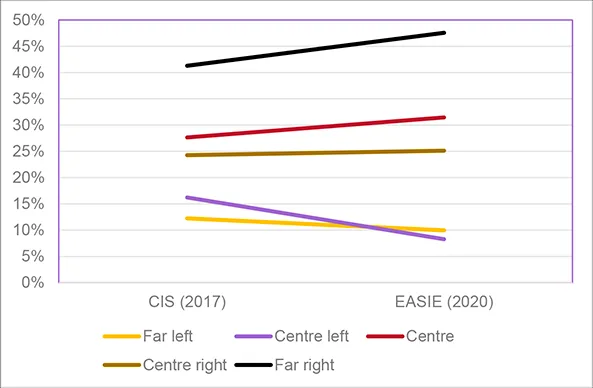
Conclusion
The strong showing of VOX in the Andalusian elections in 2018 and the European and national elections in 2019 cannot be attributed to a generalised increase in anti-immigration sentiment among the Spanish population as a whole, since public opinion towards immigration was evolving favourably during those years. The relative success of VOX in Spanish politics has primarily been driven by the Catalan conflict and less directly by other phenomena that were already present previously (the cultural reaction against feminism, the public presence of LGBTI, animal rights, cosmopolitanism and also immigration). Nonetheless, even before the initial success of VOX, attitudes to immigration were already hardening among some segments of the population, particularly among people with right-wing ideology, thus contributing to the rise of VOX in the political system.
However, following on from the party’s success, a change in trend has been seen, with a slight hardening of Spanish public opinion towards immigration. The social respectability of platforms provided by democratic institutions may be a contributory factor, making the expression of previously concealed negative opinions more acceptable. The available data do not allow us to determine the extent to which such hardening of attitudes is the result of VOX’s message and how much it can be attributed to changes in the context (the economic crisis, the pandemic and irregular arrivals on the Canary Islands).
What is clear, however, is the effect VOX is having on polarisation, causing a growing divergence of attitudes towards immigration based on ideological positions. This polarisation is ‘freezing’ opinions by ascribing them to ideologies and tainting arguments with labels related to partisan sympathies. This polarisation is concerning because it becomes an obstacle to calm and rational debate on immigration and public policies devoted to manage it.
